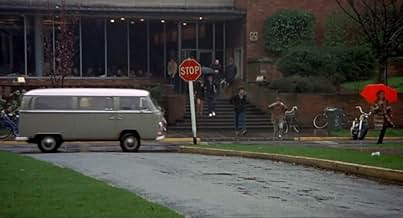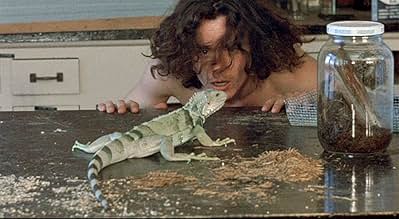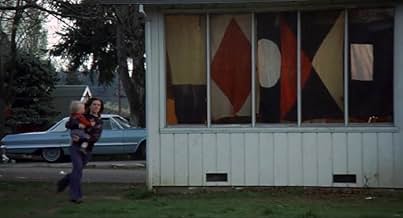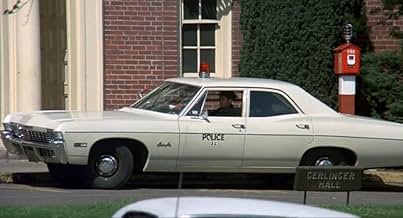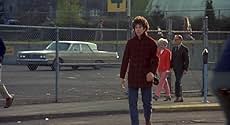IMDb RATING
5.7/10
1.9K
YOUR RATING
The star player of a college basketball team starts to go off the rails with an illicit love affair and his roommate going crazy to avoid the war draft.The star player of a college basketball team starts to go off the rails with an illicit love affair and his roommate going crazy to avoid the war draft.The star player of a college basketball team starts to go off the rails with an illicit love affair and his roommate going crazy to avoid the war draft.
- Awards
- 1 win & 1 nomination total
Michael Warren
- Easly
- (as Mike Warren)
Lynette Bernay
- Dance Instructor
- (as Lynn Bernay)
Joseph Walsh
- Announcer #1
- (as Joey Walsh)
David Ogden Stiers
- Pro Owner
- (as David Stiers)
Mireille Machu
- Secretary
- (as I.J. Jefferson)
Featured reviews
One of only three films Jack Nicholson directed. This film was kind of a dud at the time, which probably explains why Nicholson's secondary career never flowered. I have to say, he did have some talent as a director. Unfortunately, Drive, He Said isn't that good of a film. Well directed, but still a bit of a bore. William Tepper plays a college basketball star (in Ohio, as the whole film is meant to make the audience think of Kent State). His roommate, Michael Margotta, is a hippie activist who is about to be drafted. Karen Black, who made a big splash opposite Nicholson in Five Easy Pieces, plays a faculty wife with whom Tepper is having an affair. The big problem with the film is that Tepper is pretty boring and Margotta is extremely annoying. There are some good scenes, but it just doesn't come together. This one is more a candidate for rewatch than A Safe Place (which is on the same Criterion disc), though. I felt like there was something I wasn't getting. I may not have entirely liked it, but it was intriguing.
Poorly developed and fragmented movie about a confused college basketball player with a host of predictably militant and/or cynically unhappy acquaintances characteristic of 1960s academia where the film is set. I'm not sure whether we are supposed to like or even care about the characters or not, but in any event I didn't feel much of either for any of them. Jack Nicholson directed this movie with a taste for profanity and nudity. I guess he thought he was being provocative and progressively mirroring the changing cultural mores of the time. He would have fared better by putting his energy into developing characterization and refining the script that he co-wrote instead. All in all a disappointing movie which left me with a feeling of indifference about it.
Drive, He Said, Jack Nicholson's first solo outing as writer/director for BBS Productions, one of the first true indie film powerhouses, is unfortunately also it's first genuine misfire and failure for good reason: the film is virtually unwatchable.
Nicholson, while unquestionably being one of the greatest actors of our time, never seemed to get much guidance (not one of BBS' strong suits) when writing scripts. He co-wrote Head with Bob Rafelson, mostly stoned, and that actually kind of worked given that film's stream of consciousness/acid-trip feel. At least there was a guiding vision (probably by Rafelson) --- a genuine point to be made. That Nicholson was allowed to botch Jeremy Larner's lauded novel (with help from Larner) is inexcusable. It might have worked better had the actors just been allowed to improv all of their lines...it certainly couldn't have been worse.
Simple elements of the story --- that the college basketball hotshot hero (William Tepper) is boning the wife of a *professor* (not just a random boyfriend) is just glossed over and left for the audience to assume. It makes no real difference, because this story line (like all the others) never goes anywhere. Characters flounder in and out of scenes, overact, underact, mumble their lines, all seemingly at random. It gives you new appreciation for the directors who can pull this type of renegade filmmaking off well (Rafelson, Altman, Cassevetes). You simply cannot stand back and let the actors do whatever they feel like, which is obviously what Nicholson did. He mistakes indie filmmaking with making a documentary film (and even that's a stretch as most docs have a better sense of story and purpose).
Yes, I know the real point is supposed to be the juxtaposition between the go-go rah-rah pointlessness of the basketball story contrasted with the over-the-top campus radical B story starring the unfortunately untalented (and maybe just undirected) Michael Margotta as a guy so intent on dodging the draft that he will incite riots, streak, attempt to assault and rape a woman in her own home, and then loose an entire room of lab animals on each other just to be declared mentally unfit. It's all as subtle as being hit on the head with a sledgehammer and just as artful and entertaining.
If you can endure Karen Black screaming her lungs out for over five minutes straight, you just might have a chance at sitting through this interminably long ninety minute snoozer. If you buy the Criterion BBS box (an awesome set, by the way), it's worth a look because it's such a freak show, otherwise don't bother.
Note that when you read a positive review of this movie though, it is usually slathered with praise about it's nostalgia and social value/accuracy as a "gritty portrait of our times" in regards to early '70s campus friction.
There's a good reason for that too: with a movie as flimsily made as Drive, He Said, you MUST bring something to the equation yourself. God knows it isn't on the film itself.
Nicholson, while unquestionably being one of the greatest actors of our time, never seemed to get much guidance (not one of BBS' strong suits) when writing scripts. He co-wrote Head with Bob Rafelson, mostly stoned, and that actually kind of worked given that film's stream of consciousness/acid-trip feel. At least there was a guiding vision (probably by Rafelson) --- a genuine point to be made. That Nicholson was allowed to botch Jeremy Larner's lauded novel (with help from Larner) is inexcusable. It might have worked better had the actors just been allowed to improv all of their lines...it certainly couldn't have been worse.
Simple elements of the story --- that the college basketball hotshot hero (William Tepper) is boning the wife of a *professor* (not just a random boyfriend) is just glossed over and left for the audience to assume. It makes no real difference, because this story line (like all the others) never goes anywhere. Characters flounder in and out of scenes, overact, underact, mumble their lines, all seemingly at random. It gives you new appreciation for the directors who can pull this type of renegade filmmaking off well (Rafelson, Altman, Cassevetes). You simply cannot stand back and let the actors do whatever they feel like, which is obviously what Nicholson did. He mistakes indie filmmaking with making a documentary film (and even that's a stretch as most docs have a better sense of story and purpose).
Yes, I know the real point is supposed to be the juxtaposition between the go-go rah-rah pointlessness of the basketball story contrasted with the over-the-top campus radical B story starring the unfortunately untalented (and maybe just undirected) Michael Margotta as a guy so intent on dodging the draft that he will incite riots, streak, attempt to assault and rape a woman in her own home, and then loose an entire room of lab animals on each other just to be declared mentally unfit. It's all as subtle as being hit on the head with a sledgehammer and just as artful and entertaining.
If you can endure Karen Black screaming her lungs out for over five minutes straight, you just might have a chance at sitting through this interminably long ninety minute snoozer. If you buy the Criterion BBS box (an awesome set, by the way), it's worth a look because it's such a freak show, otherwise don't bother.
Note that when you read a positive review of this movie though, it is usually slathered with praise about it's nostalgia and social value/accuracy as a "gritty portrait of our times" in regards to early '70s campus friction.
There's a good reason for that too: with a movie as flimsily made as Drive, He Said, you MUST bring something to the equation yourself. God knows it isn't on the film itself.
One of the more unusual movies I've ever seen is "Drive, He Said." Made in 1971 made by the same production company that made "Easy Rider" and "Five Easy Pieces" that made Jack Nicholson a star a year or two earlier.
This was the first film directed by Jack Nicholson. It's a combination basketball, free love, anti-draft movie that was filmed on the campus of the University of Oregon. It was not well-received at the time, and was somewhat infamous for its male frontal nudity scenes. The basketball skill level seemed very high.
It's basically the story of two friends--one a basketball star and Greek major who's hormones are raging and is undecided about a pro career. The other is a guy taking drugs to try to stay out of the draft, and basically he flips out.
I thought it was an interesting premise, but I found the speech of the main characters to be stilted. In some ways it captured the ethos of U. S. campuses in the Vietnam War era pretty well.
This was the first film directed by Jack Nicholson. It's a combination basketball, free love, anti-draft movie that was filmed on the campus of the University of Oregon. It was not well-received at the time, and was somewhat infamous for its male frontal nudity scenes. The basketball skill level seemed very high.
It's basically the story of two friends--one a basketball star and Greek major who's hormones are raging and is undecided about a pro career. The other is a guy taking drugs to try to stay out of the draft, and basically he flips out.
I thought it was an interesting premise, but I found the speech of the main characters to be stilted. In some ways it captured the ethos of U. S. campuses in the Vietnam War era pretty well.
Not much to make of this directorial debut by would-be star actor and frequent attendee of Los Angeles Lakers games Jack Nicholson, "Drive, He Said," which doesn't so much get its title from the basketball played in the film as it does from a poem, "I Know a Man," by Robert Creeley, which is recited at the beginning as the college hoops game is broadcast on a TV in the background. Soon thereafter, the poem-reciting, counterculture youths dressed in camouflage paramilitary regalia invade the gymnasium of the game to put on a bit of performance art that's as vaguely against, or agitated by, rather, American militarism--specifically the Vietnam War--as is the rest of the picture. Seems the war is such a weight on these young men's minds that it drives one to insanity and another to waffle over whether he wants to really play basketball or not.
Neither character arc is very compelling, and the crazy one is over-the-top ridiculous. There are easier ways to avoid a draft, guys, whether it's for the NBA or USA. And poor Karen Black having to put up with this tomfoolery and, worse, replaying an attempted-rape climax as old as D. W. Griffith silent films and the Victorian literature he in turn stole it from. The entire film is as muddled as its basketball footage with barely a narrative to be found, and it's undoubtedly dated as an independent film from the early '70s.
On the other hand, there's enough here, to use a cliché from another sport, out of left field to be at least bemusing. Plus, at least the actors evidently know how to dribble and shoot enough to keep up with apparent real former collegiate athletes. The Leopards team's mascot is a real, caged leopard that occupies the sidelines. A lot here concerning caged animals and letting them loose, which is the sort of motif that goes for symbolism in this picture. At one point, a montage of slow-motion basketball footage is played to "The Star-Spangled Banner." As the making-of-video included on the Criterion disc claims, it also includes some guerilla filmmaking exploiting a real riot that broke out during filming at the University of Oregon, which fits seamlessly within the rest of the picture's aesthetics. The remainder of the movie mostly seems to merely revel in the Sexual Revolution, including a considerable amount of focus on male genitalia. Nicholson claims he wanted a "symphony of dicks" during a locker-room shower scene, which supposedly he had to compromise on, but not by much.
Neither character arc is very compelling, and the crazy one is over-the-top ridiculous. There are easier ways to avoid a draft, guys, whether it's for the NBA or USA. And poor Karen Black having to put up with this tomfoolery and, worse, replaying an attempted-rape climax as old as D. W. Griffith silent films and the Victorian literature he in turn stole it from. The entire film is as muddled as its basketball footage with barely a narrative to be found, and it's undoubtedly dated as an independent film from the early '70s.
On the other hand, there's enough here, to use a cliché from another sport, out of left field to be at least bemusing. Plus, at least the actors evidently know how to dribble and shoot enough to keep up with apparent real former collegiate athletes. The Leopards team's mascot is a real, caged leopard that occupies the sidelines. A lot here concerning caged animals and letting them loose, which is the sort of motif that goes for symbolism in this picture. At one point, a montage of slow-motion basketball footage is played to "The Star-Spangled Banner." As the making-of-video included on the Criterion disc claims, it also includes some guerilla filmmaking exploiting a real riot that broke out during filming at the University of Oregon, which fits seamlessly within the rest of the picture's aesthetics. The remainder of the movie mostly seems to merely revel in the Sexual Revolution, including a considerable amount of focus on male genitalia. Nicholson claims he wanted a "symphony of dicks" during a locker-room shower scene, which supposedly he had to compromise on, but not by much.
Did you know
- TriviaJack Nicholson's solo directorial debut. It was one of two post-Easy Rider (1969) Nicholson films that weren't released on any kind of home video until 2010. That year, the Criterion Collection released this movie and Un coin tranquille (1971) on DVD and Blu-ray as part of their "America Lost And Found - The BBS Story" box set.
- GoofsDuring the second basketball game, the writing on the Ohio Leopards jerseys frequently changes from "Leopards" to "Ohio" on a shot by shot basis.
- Crazy creditsThe opening credits are typed so small, one can hardly read them. Sometimes the letters in the names are blurred because of their ultra-small size.
- ConnectionsFeatured in Skin: A History of Nudity in the Movies (2020)
- How long is Drive, He Said?Powered by Alexa
Details
Box office
- Budget
- $800,000 (estimated)
Contribute to this page
Suggest an edit or add missing content


